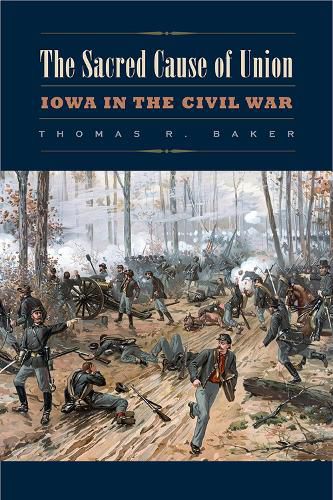Readings Newsletter
Become a Readings Member to make your shopping experience even easier.
Sign in or sign up for free!
You’re not far away from qualifying for FREE standard shipping within Australia
You’ve qualified for FREE standard shipping within Australia
The cart is loading…






The Sacred Cause of Union highlights Iowans’ important role in reuniting the nation when the battle over slavery tore it asunder. In this first-ever survey of the state’s Civil War history, Thomas Baker interweaves economics, politics, army recruitment, battlefield performance, and government administration. Scattered across more than a dozen states and territories, Iowa’s fighting men marched long distances and won battles against larger rebel armies despite having little food or shelter and sometimes poor equipment. On their own initiative, the state’s women ventured south to the battlefields to tend to the sick and injured, and farm families produced mountains of food to feed hungry federal armies. In the absence of a coordinated military supply system, women’s volunteer organisations were instrumental in delivering food, clothing, medicines, and other supplies to those who needed them. All of these efforts contributed mightily to the Union victory and catapulted Iowa into the top circle of most influential states in the nation.
To shed light on how individual Iowans experienced the war, the book profiles six state residents. Three were well-known. Annie Wittenmyer, a divorced woman with roots in Virginia, led the state’s efforts to ship clothing and food to the soldiers. Alexander Clark, a Muscatine businessman and the son of former slaves, eloquently championed the rights of African Americans. Cyrus Carpenter, a Pennsylvania-born land surveyor anxious to make his fortune, served in the army and then headed the state’s Radical Republican faction after the war, ultimately being elected governor.
Three never became famous. Ben Stevens, a young, unemployed carpenter, fought in an Iowa regiment at Shiloh, and then transferred to a Louisiana African American regiment so that he could lead the former slaves into battle. Farm boy Abner Dunham defended the Sunken Road at the Battle of Shiloh, before spending seven grim months in Confederate prison camps. The young Charles Musser faced pressure from his neighbours to enlist and from his parents to remain at home to work on the farm. Soon after he signed on to serve the Union, he discovered that his older brother had joined the Confederate Army. Through the letters and lives of these six Iowans, Thomas Baker shows how the Civil War transformed the state at the same time that Iowans transformed the nation.
$9.00 standard shipping within Australia
FREE standard shipping within Australia for orders over $100.00
Express & International shipping calculated at checkout
The Sacred Cause of Union highlights Iowans’ important role in reuniting the nation when the battle over slavery tore it asunder. In this first-ever survey of the state’s Civil War history, Thomas Baker interweaves economics, politics, army recruitment, battlefield performance, and government administration. Scattered across more than a dozen states and territories, Iowa’s fighting men marched long distances and won battles against larger rebel armies despite having little food or shelter and sometimes poor equipment. On their own initiative, the state’s women ventured south to the battlefields to tend to the sick and injured, and farm families produced mountains of food to feed hungry federal armies. In the absence of a coordinated military supply system, women’s volunteer organisations were instrumental in delivering food, clothing, medicines, and other supplies to those who needed them. All of these efforts contributed mightily to the Union victory and catapulted Iowa into the top circle of most influential states in the nation.
To shed light on how individual Iowans experienced the war, the book profiles six state residents. Three were well-known. Annie Wittenmyer, a divorced woman with roots in Virginia, led the state’s efforts to ship clothing and food to the soldiers. Alexander Clark, a Muscatine businessman and the son of former slaves, eloquently championed the rights of African Americans. Cyrus Carpenter, a Pennsylvania-born land surveyor anxious to make his fortune, served in the army and then headed the state’s Radical Republican faction after the war, ultimately being elected governor.
Three never became famous. Ben Stevens, a young, unemployed carpenter, fought in an Iowa regiment at Shiloh, and then transferred to a Louisiana African American regiment so that he could lead the former slaves into battle. Farm boy Abner Dunham defended the Sunken Road at the Battle of Shiloh, before spending seven grim months in Confederate prison camps. The young Charles Musser faced pressure from his neighbours to enlist and from his parents to remain at home to work on the farm. Soon after he signed on to serve the Union, he discovered that his older brother had joined the Confederate Army. Through the letters and lives of these six Iowans, Thomas Baker shows how the Civil War transformed the state at the same time that Iowans transformed the nation.